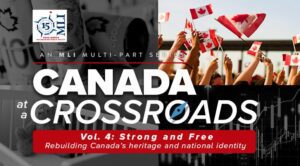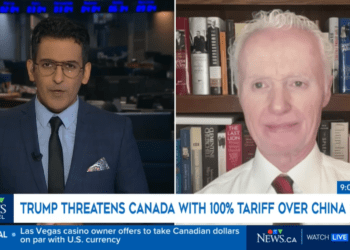By Geoff Russ, July 25, 2025
If Canadian multiculturalism was ever a model for the world, that is no longer the case.
Too many residents of Canada – citizen or otherwise – have started turning on neighbours due to differing ethnic or religious backgrounds. The importation of foreign conflicts and ideas into Canada is real, and the country has found itself in the crosshairs.
Canadian flags have been burned in Vancouver at rallies celebrating Hamas and Hezbollah, and synagogues have been firebombed. Even more ominous was the Pakistani national arrested in Quebec last September, who had planned to travel to New York City and commit a mass murder of Jews.
The recent downturn in relations with the United States has sparked a renewed sense of Canadian patriotism and unity, but this does not erase the factors that led to its breakdown in past decades.
The phenomenon is not unique to Canada, and has been mirrored by similar violence in Britain and Australia, where a synagogue was deliberately burnt in Melbourne last December.
Why is Canada and the rest of the Anglosphere so susceptible to being overtaken by foreign hatreds? There are two key reasons. One is that we live in an era of mass immigration, and the other is a reluctance to integrate newcomers.
Engaging in violence inspired by Middle Eastern affairs has no place in this country. Canadian politicians have said as much, but done little to ensure it is eliminated.
Many of the sectarian conflicts associated with Canada’s founding peoples – like tensions between Protestants and Catholics – were mostly stamped out by the 1970s. Attempting to resurrect old world tensions in 2025 should be condemned in the strongest possible terms as un-Canadian.
The rise of such tensions should hammer home some urgent messages to Canada’s leadership: it must help newcomers to fit in, and it must enforce a culture where refusing to reject imported extremisms has severe consequences, including the possibility of being excluded from obtaining citizenship.
Canada may have appeared to be a trailblazer when then-prime minister Pierre Trudeau first announced the government’s multiculturalism policy in 1971. The policy was an outcome of the Royal Commission on Bilingualism and Biculturalism’s final report, and later formalized in the Canadian Multiculturalism Act of 1988. But it hardly sets the country apart from its Anglosphere peers today, all of whom are equally or nearly as diverse and multicultural.
In 1971, Canada was a far more homogeneous country in which the majority possessed a distinctly Anglo or Québécois culture. The Quebec question aside, it was easy to take cultural harmony for granted.
The old model of laissez-faire multiculturalism – which assumed a gradual, gentle assimilation – is no longer valid. When Pierre Trudeau’s government was attempting to reinvent Canada as a multicultural state where no “all-Canadian” boy could possibly exist, he surely did not anticipate the levels of degradation to Canadian identity that we see today.
In the modern era, acquiring Canadian citizenship too often resembles a business deal akin to a Costco membership, rather than reflecting a heartfelt conviction to join a distinct and unique community. Old-world cultures are very durable, and present-day Canada allows them to take on greater importance here in the absence of a deliberately articulated Canadianess.
Seeking to create a cosmopolitan identity, Canada has eliminated the cultural obligations of Canadian citizenry. That’s enabled those older, foreign traditions to fill the void entirely. It is only human that people desire belonging, and Canada ought to be able to provide it. Instead, it’s offering an identity vacuum that leaves newcomers looking for belonging elsewhere.
A survey by Leger conducted in September found that identification with Canada was the lowest among young people, who are disproportionately from recent immigrant backgrounds.
Multiculturalism is a liberal ideal, and liberalism alone cannot sustain a community. Liberalism sees cultural ties, traditions, and structures as restraints that people must be liberated from.
For example, it was recently reported that the Waterloo Region District School Board has been distributing teaching materials asserting that the term “family” is harmful to “racialized” students. The board attempted to explain away the controversy by stating that the materials are contextual, but this makes them no less an obscenity, and an affront to basic Canadian values.
Strong families, no matter who comprises them, are a pillar of being Canadian, and vital for holding this society together. As a means of upholding our most basic cultural norms, provincial authorities ought to take strong action – such as the punitive partial defunding of school boards that attack families.
Most immigrants to Canada come from countries that greatly value family. When public school administrators undermine this important social structure they will alienate newcomers and create distrust. Much of the parental rights movement in Canada has been driven by immigrant families who share concerns with their Canadian-born counterparts over the direction of public schools.
 The burden of integration will always be a two-way street between governments and citizens.
The burden of integration will always be a two-way street between governments and citizens.
In May, Quebec’s provincial government passed Bill 84, An Act respecting national integration. It is an important piece of legislation that should serve as a template for the rest of Canada on how to balance diversity and cohesiveness in modern times.
Bill 84 mandates that new Quebec residents must firmly accept the values of the province and Québéc nation. These include active respect for democracy, secularism, gender equality, and use of the French language.
The bill encourages participation by tying funding for public cultural events to respect and acknowledgment of Quebec and its symbols in the event’s programming. Other provinces and the federal government should take note: this is an avenue for bringing Canadians together and creating a lasting sense of belonging.
Whether they come from Ottawa or the provinces, integrationist policies must strive to foster an understanding of Canadian values among newcomers, and encourage their participation in Canadian democratic institutions with the purpose of serving Canada alone.
Too often, diasporic lobby groups in Western countries co-opt national institutions for foreign causes – such as attempting to turn elections into referendums on who can best support Gaza. This was demonstrated in the 2024 British election, and in Montreal’s LaSalle—Émard—Verdun federal byelection that same summer.
Canada should implement mandatory and more rigorous civic education programs for newcomers, emphasizing the good of Canada’s parliamentary democracy and its history. These programs should be put in place alongside a Canadian values test. Surveys find upwards of 70 per cent of Canadians collectively support such measures. These tests and programs should be treated seriously, and made essential to obtaining citizenship like a road test is required for attaining a driver’s licence.
Any re-assertion of Canadian culture must be wary of constitutional restraints. It is essential that the Charter of Rights and Freedoms is kept in mind – not out of reverence for the document, but to pragmatically ensure legislation is not bogged down by court challenges.
Section 27 of the Charter recognizes Canada’s multicultural heritage. But it is considered interpretive, and Canadian governments have wide leeway when it comes to crafting laws around it.
For example, Quebec’s 2019 passage of Bill 21, An Act respecting the laicity of the State, prohibited select public workers in positions of authority from wearing religious symbols or garb. It was challenged, but upheld by the provincial appeals court. The Supreme Court of Canada is set to hear another Bill 21 challenge this year.
Legislating around multiculturalism and integration can be messy. But it is necessary, and it is possible.
Speaking up for Canada’s historical foundations and the inherent good of our institutions, whether found in the government or elsewhere, is the first step towards re-asserting a common culture.
Prime Minister Mark Carney’s invitation to King Charles III to open Parliament and his willingness to express pride in Canada’s British heritage – from which these institutions sprung – are gestures that were sorely missed in recent years.
Reclaiming a concrete national story is vital for identity. Politicians from across the spectrum must not shy away from embracing this. Otherwise, it will be an even greater challenge to present newcomers with something to integrate into.
New Canadians cannot be expected to give up their ancestral heritage. That’s a cruel and unneeded course of action. Integration in a multicultural, modern Canada means fostering dualism.
It should not be hard to define what a Canadian is.
Broadly speaking, Canada is part of the Anglo-American world, has a stable political tradition, and participates in the culture of the English language.
The flavours of all ten provinces and three territories are contained within the country – which is deeply affected by the rugged and mostly wild geography of the land itself. The one standout is Quebec, which is officially and strongly francophone, but still participates in both the English- and French-speaking cultural spheres.
Quebec’s leadership has not refused to embrace its identity, nor shied away from asserting it. The rest of Canada should take note, particularly when it comes to modeling approaches like Quebec’s Bill 84.
This is constitutionally a nation of two founding peoples, who remain the basis of this lasting, thriving country. We need to tell that story.
Most immigrants to Canada come from older cultures with long histories and traditions that include heroes, symbols, and a national ethos. Refusing to uphold Canada makes this country an outlier, and not in a positive fashion.
Canadians cannot become a hollow people, where citizenship only exists on paper.
There is no silver bullet that will magically re-create a permanent sense of unity and integration in Canada. It will require re-orienting the levers of government towards the goal of a common culture.
If official multiculturalism was how Canada responded to a diversifying world, strengthening national culture going forward is the only way to ensure being Canadian means anything by 2050.
Geoff Russ is a writer and policy analyst, and a contributor for the Macdonald-Laurier Institute.






